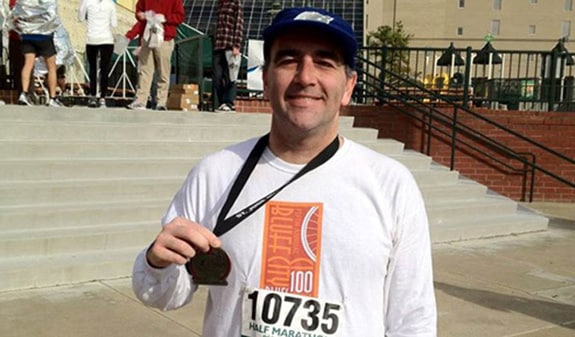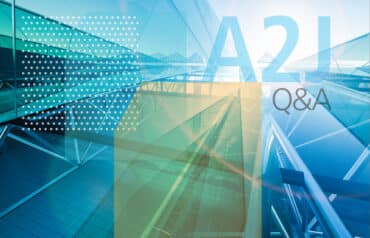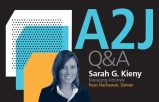Who are these “enterprising lawyers”? Actually, they are easy to spot. Look for the more engaged and happier lawyers in the crowd. Deeply invested in the power of the work they do for their clients, they have ample interests beyond the practice of law as well. And they seem to have more energy for getting things done than anyone in the crowd. You probably know one or two—you may even be one yourself! Meet Greg Siskind—an immigration lawyer who has, quite literally, shown other lawyers how it’s done on the Internet. That’s him below after running the St. Jude Half Marathon in 2:08 last Saturday.

Greg Siskind
Siskind Susser, PC – Immigration Lawyers
Memphis, TN
Vanderbilt University (BA, 1986)
University of Chicago School of Law (JD, 1990)
Why did you want to be a lawyer?
I thought I wanted to get into a political career—on the staff side as opposed to running for office—and believed legal training would make sense for a lawmaking career. That didn’t end up happening, but I actually do a lot of legislative advocacy work as a lawyer, including having drafted several parts of the Immigration and Nationality Act. Also, I was a very young college graduate—just 19. I didn’t think I was ready for the real world and law school was a good place to hide out for a while.
What is the focus of your law practice?
I am an immigration lawyer. My personal practice focuses on highly educated individuals, investors, artists and athletes, as well as helping employers comply with immigration law.
What is the real reason clients hire you?
I hope it’s because they think I know what I’m doing in a practice area that is incredibly murky and complex. I think I have achieved a reputation for being one of the top immigration lawyers because of the considerable amount of writing and speaking I do in the field. My website has thousands of articles I’ve published over 17 years. I’ve written four books, have a very popular blog and speak at large and small venues every month. The writing is aimed at peers as well as potential clients, which has helped me with getting ranked at the top of the major ranking services (Chambers, Who’s Who in Corporate Immigration Law, Best Lawyers, Avvo, Top 150 lawyers in Tennessee, etc.). Also, I get interviewed frequently by national media outlets—and that gives clients a lot of confidence in your ability.
Who was your most important mentor and, in a sentence, what did they teach you?
My father was in advertising and marketing for his whole career (after going to law school) and was immensely helpful in offering suggestions, particularly regarding how professional services industry clients think and act.
What about practicing law did you learn the hard way?
Just because an idea is a good one doesn’t mean you should pursue it. I don’t mean you should pursue bad ideas. For example, I’d like to think I’m good at generating effective strategies for developing new business. Unfortunately, I haven’t found a way to generate more time. When I’ve tried to do too many new things at once, none have come off as well as they should have. So I’ve gotten better about picking and choosing what I like best and passing on the others, or at least waiting for the right time. But I still make the mistake of taking on too many projects at once.
What is your favorite technology tool?
So hard to choose. I’ll tell you about two. First, although it may sound a little mundane at this point, I don’t know how I could practice as effectively without Microsoft Outlook. I’m an Apple devotee, but I run Windows on my iMac and MacBook Pro solely to use Outlook. (Yes, I know there is a Mac version of Outlook, but it’s not the same). I get hundreds of emails every day and Outlook makes it possible to effectively organize all of that information. There are plug-ins that allow me to integrate Adobe Acrobat and my case/document management system. With Anagram shortcut keys, I can highlight a signature block in an email and the contact is automatically created. More people are migrating to Gmail and other programs, but in terms of features and the ability to handle volume, nothing beats Outlook.
Second, my Fujitsu ScanSnap sheetfed scanner is a brilliant piece of technology. It is fast, scans on both sides of the page, has very user-friendly organization software, and came with a full Adobe Acrobat license that allows for all scans to be converted to PDFs already set up for searching. I’ve set up SugarSync to automatically back up every scan into the cloud and I can see all my scans on my iPhone and iPad in the same folders as on my ScanSnap organizer software on my computer. ScanSnap also comes with Cardminder, which scans business cards, recognizes the text and then easily exports the cards to Outlook.
What is your favorite non-technology tool?
We’re having a good year, so I decided to splurge on a Lifeform chair from the Relax the Back Store. For most of my career, I skimped on chairs and had an aching back by the end of every day. Spending in the four figures on a desk chair was something that I would have considered a big waste of money. But a chair with excellent lumbar support, adjustability, and a seat and back with memory foam—all are a major improvement.
How would you describe the location and décor of your office?
A lot of people in Memphis know our building well. We were forced to relocate six years ago because our lease was up, so we decided to buy. We found a hideously ugly, circa1970 building. It was a mostly windowless 12,000 square foot box—think parking garage without the charm. The place was gutted and a mess. People could not get past the look of the building, despite the great location, the large amount of parking (more than 60 spots) and the ample size. We bought it for a little over $500,000, after it had been on the market for two years. We found a young architect and told him be creative, and that’s certainly what he was. We put another $500,000 into the renovation, including a new façade and parking lot resurfacing. The overall price was still fairly low for the size and location, and the architect’s work was magnificent. He earned the Tennessee Institute of Architects award for one of the top three projects in the state in 2007. ArchDaily.com has listed the Siskind Susser building on its “don’t miss” list for a visit to Memphis. (Here’s a blog post about the recognition with a photo that shows off the building at night.)
As for the décor, the inside is as stylish and modern as the outside. The place looks more like an ultramodern advertising agency than a law firm. Wild colors, lots of glass and a loft-like feel. The look of the building definitely reflects the values of the firm.
Why would someone describe you as “enterprising?”
I think I’ve had several firsts over the years when it comes to marketing and technology that might cause people to give me that label. Here are a couple of examples.
- Many people remember me as having set up one of the first law firm websites in 1994 (third overall and the first for an immigration lawyer, for a solo lawyer and for a lawyer in the Southern United States). I was a young immigration lawyer with virtually no budget, trying to start my own firm in a city without a lot of immigration clients. The website allowed me to get instant publicity and reach markets far from my own. I wrote a bestselling ABA book, Lawyer’s Guide to Marketing on the Internet, in 1996 (now in its third edition), and my website was the subject of dozens of stories in places like the New York Times, Wall Street Journal and NPR. In 1997, I set up the first lawyer blog.
- Physician immigration was one of the practice areas I had my eye on early on. The work is especially challenging, clients are willing to pay for quality service and, since many of the doctors serve in the most medically underserved areas in the country, I could feel pretty good about the work. Unfortunately, just wanting to do the work was not going to be enough. So I did a number of things to establish a clientele:
- Authored a book on immigration that has been published annually since 1998.
- Regularly attended and exhibited at meetings of physicians, physician recruiters and employers.
- Created a web portal for information on physician immigration.
- Helped start an immigration section for the American Health Lawyers Association and am currently the chair of a physician immigration bar association.
- Co-drafted several bills on physician immigration including a few that are now law.
- Convinced a federal agency to create a program to sponsor foreign doctors to work in underserved areas and then drafted the program for them.
- More recently, I set up a job site helping to link American-trained international physicians and employers, and a bulletin board site with forums geared toward physician immigration issues. The end result has been one of the largest and best known physician immigration practices in the country.
What is the first thing you “check” each morning?
I usually scan The New York Times. Since I blog on immigration and politics, staying on top of the news is critical. I have a pretty short attention span, so I’m usually also checking email and reading websites at the same time.
Where do you think the practice of law is going?
In the U.S., we’re going to see some of the trends that stalled out during the recession resume shortly. Boutique practices that can market narrow areas of expertise will prosper—as will the very large firms that can invest in branding and achieve economies of scale. Mid-sized regional firms will suffer. I expect to see market mismatches in terms of the supply of lawyers in the mid- and long-term. Larger firms will resume hiring in large numbers. But they are not going to go too much deeper in terms of recruiting at lower tier schools, or go too far down in the ranks at the schools with higher rankings. Hiring foreign lawyers—particularly from the UK, Canada and Australia—will pick up (and I’ll be there to help!).
A lot of young lawyers will still not find jobs in the field, or jobs that are rewarding. And law schools will have to answer for why they have dramatically hiked tuition without being able to demonstrate that their graduates will be able to find jobs to pay back their law school debt. Eventually, these market forces will lead to a correction with enrollments shrinking and law schools shutting their doors.
A lot of these young unemployed and underemployed lawyers will take the plunge, like I did in 1994, and set up solo and small practices. I’d like to see “incubators” set up to encourage lawyer entrepreneurs by providing reasonably priced shared offices, mentoring support from other lawyers, practice management support from the bar associations, and so on.
Also, market forces that have led firms into non-law businesses will continue to encourage spin-off enterprises. Likewise, rules surrounding non-lawyer ownership of law practices will gradually expand, as has been the case in other countries.
Where are you going?
I am largely focusing on continuing to expand in four core practice areas—doctors, employer compliance (I-9s and E-Verify), investors and arts/sports immigration. I’ll be focusing on what I know has always worked—writing. Writing new books, writing for industry publications, blogging regularly and writing newsletters have all worked well, and I don’t expect that to change. I’ll also manage a major upgrade on our website this coming year. Beyond that, my goal is to focus more on grooming other lawyers to take on more of these roles so my firm is not as dependent on me being able to do all of these tasks alone.
What are people most surprised to learn about you?
For about a year, I’ve been making my 15-mile round trip commute to work by bicycle. We put in a shower and locker facility at the office early in 2011, and I’ve been taking advantage just about every day. Riding in rain, ice and snow has been a bit of a challenge, but not nearly as bad as people think. Of course, REI’s annual report should have a footnote referencing my change in transportation mode as an explanation for their robust sales in winter cycling gear.
What do you use every single day that you could actually easily do without?
See the answer above about how I found out my car fit that bill. As for current habits, it wouldn’t hurt to stop answering emails and watching “The Daily Show” and “Colbert Report” until 11 p.m., so I could turn in a little earlier and get more sleep.
What three things must you always have in your brief bag, desk drawer or refrigerator?
Since I cycle to work each day with my backpack, I’m assuming that’s the equivalent of my brief bag. I usually keep a couple of charged solar-powered spare batteries for my iPhone, at least one USB key and various bike accessories (raincoat, waterproof backpack covering, extra gloves, etc.).
Where do you turn when things go really badly?
To my wife or my rabbi for the really, really bad things (fortunately, they don’t come along a lot). Otherwise, I’m always training for a triathlon, bike century or half marathon and my workouts are a good way for me to either stop thinking about something or to start thinking creatively about how to deal with a bad situation.
__________________________________
More About Greg Siskind
Greg Siskind is an immigration lawyer at Siskind Susser P.C. – Immigration Lawyers in Memphis, TN. He blogs about immigration law and policy here.
Illustration ©ImageZoo.Photos courtesy of Greg Siskind.






















